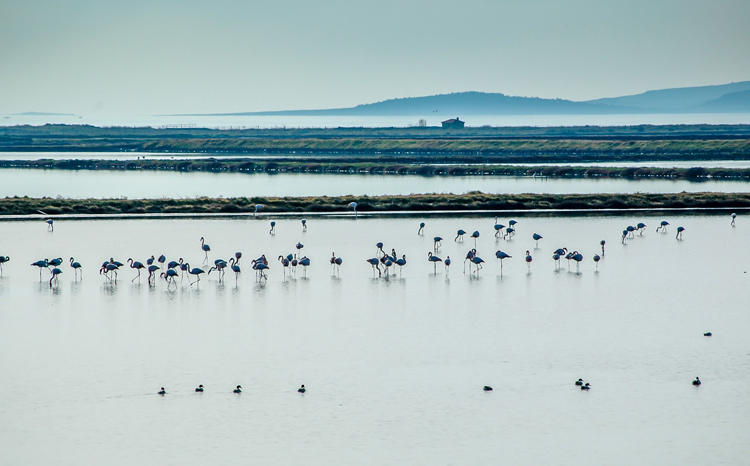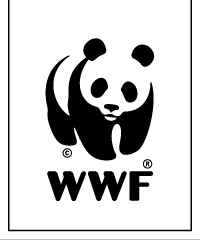Unknown Mediterranean hotspots recognised by Ramsar wetlands convention
Thursday, 11 June 2015
An important initiative of Greece leads to the adoption of a resolution for the “Conservation of Mediterranean Basin island wetlands”
Greece brings to the spotlight the urgency to conserve the fragile island wetlands of the Mediterranean, through a resolution that was unanimously adopted on June 8th by the plenary of the 12th Conference of the Parties (COP12) to the Convention on Wetlands of international significance (Ramsar, Iran, 1971).
The resolution, which was submitted by Greece (Ministry Of Environment, Energy and Climate Change) in 2014, starts with the recognition that “the Mediterranean Basin is a global biodiversity hotspot and hosts one of the largest groups of islands in the world with a rich history and varied cultural values, while it remains one of the leading tourist destinations in the world”. It consequently “calls upon Contracting Parties in and around the Mediterranean to address urgently the significant human-induced pressures threatening island wetlands through effective and decisive legislative or executive measures and other actions which apply a precautionary approach that would prevent the destruction of island wetlands, while developing more long-term and integrated strategies or plans, so as to ensure the conservation of their biodiversity, and the maintenance of their hydrological, cultural and social values”.
This important development is the outcome of a decade of systematic work by WWF Greece, aimed at conserving the fragile wetland hotspots and defending them from the mounting human induced pressures. The immense values of island wetlands include shielding coastal areas from erosion and desertification and protecting island communities from the impacts of climate change. They also form unique landscapes that add to the touristic attractiveness of Mediterranean islands.

©Kaloust Paragamian / WWF Greece
More pictures here
WWF Greece’s work for the protection of these fragile ecosystems was no easy task. When the project started in 2004 no one knew how many island wetlands existed or where they were. This fundamental knowledge gap was eventually filled through systematic field research and led to the recording of the ecological status of 806 wetlands on 75 Greek islands. WWF Greece made this knowledge public and open access, through the web mapping application Ygrotopio.
The next gap addressed by WWF Greece was institutional: the overwhelming majority of these wetlands were not protected under any legal framework. The threat of destruction and disappearance overnight from the map, due to human activities such as drainage and building, was (and remains) pressing. In 2011, WWF Greece contributed to the formulation of the Biodiversity Law 3937/2011, which included specific clauses for the conservation of island wetlands. In June 2012, a special Presidential Decree specified the measures set by the Biodiversity Law and granted strict legal protection to 380 natural wetlands on 59 islands, all of which had been monitored and recorded by WWF Greece. At the same time the WWF Greece team worked locally on the ground to address numerous cases of illegal actions that threatened wetlands on many islands, such as the Papas marsh on the island of Ios, the reedbed of Malia and the estuary of Moronis in Crete, the Dipi Marsh of Lesvos and many more.
In an effort to spread to the world the example set by Greece through the groundbreaking conservation programme and the establishment of laws and policies for the conservation of island wetlands, WWF Greece and the services of the Environment Ministry worked in close collaboration, which resulted in the submission of the draft resolution to the Secretariat of the Ramsar Convention.
WWF Greece acknowledges the significant contribution of the Ministry’s services and the staff who wholeheartedly embraced this initiative and supported the submission of the draft resolution to the Secretariat of the RAMSAR Convention.
“This resolution was warmly welcomed by all the national delegations and improved the position of Greece in the framework of the Ramsar Convention, where the only focus until the previous conference was the reference of Greece for the bad situation of the majority of the 10 Greek wetlands protected under the Convention. A great deal needs to be done to turn resolutions into concrete action but there is no doubt that this is a major conservation victory for the island biodiversity hotpots and the Mediterranean as a whole”, states Demetres Karavellas, Director of WWF Greece.
“Progress has been made for Mediterranean wetlands. The Ramsar Conference of the Parties, meeting in Punta del Este, Uruguay, has adopted a resolution inviting countries to identify and protect, as a matter of urgency, wetlands in the Mediterranean islands. Hundreds, if not thousands, of island wetlands play a significant role for humans and nature, but they are not being adequately identified and protected. With this resolution, we can work with governments and civil society organizations to safeguard those very valuable ecosystems for the benefit of islanders and biodiversity in our region”, states Delmar Blasco, Coordinator of the MedWet Initiative for Mediterranean Wetlands.
Notes to editors:
- The resolution available here.
- Greek island wetlands through the Ygrotopio mapping application.
- [Factsheet] An outline of the Conservation of Greece’s island wetlands initiative. Available here.
- A synopsis of the actions of the programme for island wetlands
- Pictures from Greek island wetlands available here. Tiles of the pictures refer to the credits as well.
For more information:
Iasonas Kantas, Media Οfficer WWF Greece, Tel: +30 210 33 14 893, Mob: +30 697 185 9632, This email address is being protected from spambots. You need JavaScript enabled to view it.
Share this



